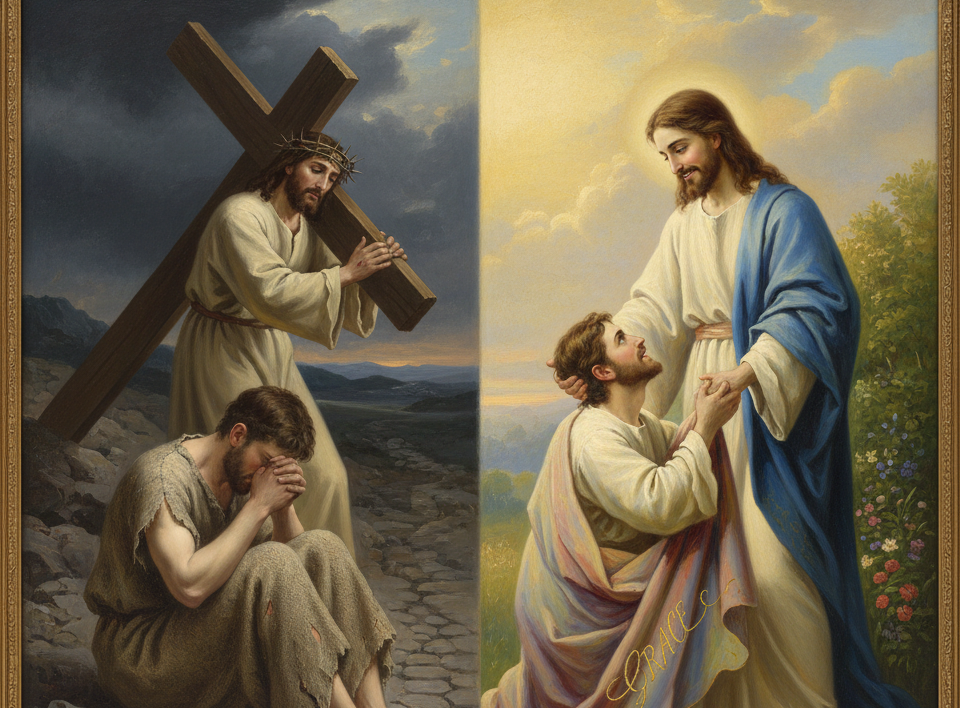Divine Retreat Centre UK – Official Website

Power Of Praise
July 15, 2025
Do you have time for God?
August 5, 2025Reflection on Luke 5:1–11
Luke 5:1–11 is a very interesting passage. In it, we read about the calling of the first four disciples of Jesus. Let us take it in parts and learn from it.
Luke 5:1–3
“Once while Jesus was standing beside the lake of Gennesaret, and the crowd was pressing in on Him to hear the word of God, He saw two boats by the lake; but the fishermen had gone out of them and were washing their nets. Getting into one of the boats, which was Simon’s, He asked him to put it out a little from the land. Then He sat down and taught the crowds from the boat.”
Simon Peter had encountered Jesus earlier. He had already seen Jesus perform miracles. In fact, Jesus had been to Simon’s house and had healed his mother-in-law. This was Peter’s second encounter with Jesus. Jesus was standing at the shore, and the whole place was filled with a massive crowd. The crowd was pulling and pressing into Him. They wanted to listen to the word of God.
Jesus was well-known from the beginning of His ministry. People liked to listen to Him and sought Him out. He spent much of His time healing, preaching, and praying.
Luke 5:15–16
“But now more than ever the word about Jesus spread abroad; many crowds would gather to hear Him and to be cured of their diseases. But He would withdraw to deserted places and pray.”
Instead of enjoying His fame, Jesus would withdraw and go to a deserted place to pray. He spent time praying alone, where He would not be disturbed. It is unlike us. When we become well-known, we often spend more time appointing secretaries and helpers. We want assistants to handle our tasks. We take advantage of such opportunities.
But the Lord wants us to go to a quiet place and spend more time in prayer, reflection, and introspection. By this, we not only serve others but also nourish ourselves.
Returning to Luke 5:2 and onward, Jesus saw two boats on the shore. The fishermen had returned from fishing and were washing their nets. They had tried their best to catch fish but caught nothing. Since they were experienced fishermen, they knew it was useless to continue fishing, so they returned to shore.
Perhaps one boat belonged to Simon Peter and Andrew, and the other to James and John. The other fishermen were likely busy washing their nets, and Simon Peter may have been in the boat listening to Jesus preach. Jesus got into Peter’s boat and told him to put it a little away from the shore. Then Jesus sat down and began preaching to the people from the boat.
Sitting while preaching was a sign of a Rabbi or teacher. Whenever the Pope teaches on dogma or official Church teachings, he sits at the Cathedra (meaning “seat”) and delivers the teaching.
Luke 5:4
“When He had finished speaking, He said to Simon, ‘Put out into the deep water and let down your nets for a catch.'”
When Jesus finished preaching, He told Simon Peter to put his net into the deep water for a catch. First, Jesus used Peter’s boat for preaching. Now He wanted to reward him. When you are used by God or in the service of God, there are two special blessings: a reward from God, and a special calling.
When you are used by God, do not feel exploited. Instead, feel privileged and chosen. You will never lose when serving God. Know that something good and better is coming your way. Be willing—just as Peter willingly gave his boat for preaching.
After the preaching, it was Jesus’ turn to bless Peter. God often asks something from us, and if we give it willingly, He blesses us in return.
In the beginning, God called Abraham and asked, “Do you love Me?” Abraham answered, “Yes Lord, I love You more than anything else.”
Abraham was childless and waited for a child. When he was 75 years old, God told him, “I will give you a child.” But God did not fulfill that promise immediately. Abraham waited patiently. When he turned 100, God gave him a son.
Abraham was happy. But then God tested him. God told him, “Abraham, take your son and go to Mount Moriah and sacrifice him there.”
Abraham did not question or doubt God. He obeyed and was about to sacrifice his son, but God stopped him and protected the child. God said, “Out of your love for Me, you were ready to sacrifice your son. Now I will give My Son for your descendants.” Thus, God sent His only Son to this world to save us, the descendants of Abraham.
When God puts us to the test or asks for sacrifice, we should recognize that we are chosen—for His mission, for something great and good.
Colossians 3:23
“Whatever your task, put yourselves into it, as done for the Lord and not for your masters.”
Whatever God has given you to do, put your heart into it. For example, if you are a nurse, work for the Lord, not just for your superiors. Whether you’re a businessman, driver, cleaner, or political leader—whatever your work—serve as if serving God.
When you work for the Lord, you don’t get tired or frustrated easily. Sometimes husbands say, “I work so hard for my family,” or wives say the same. Even housewives, in all their responsibilities—cleaning, cooking, raising children—should do everything for the Lord. If we focus only on human praise, we gain little. But God rewards our hard work.
Only God can truly satisfy and reward us. When Peter gave his boat to Jesus willingly, God rewarded him with a boat full of fish. God blessed his partners too.
Sometimes, we get tired or feel burdened. But do not be discouraged. Offer it all to the Lord.
Deuteronomy 28:47–48
“Because you did not serve the Lord your God joyfully and gladly in the time of prosperity, therefore in hunger and thirst, in nakedness and dire poverty, you will serve the enemies the Lord sends against you.”
Whatever we do, we should do it joyfully. Whether husband, wife, or child—serve the Lord in your roles with a joyful heart.
Grumbling makes room for the enemy. It allows negativity and disorder to enter our homes. But joyful service invites God’s protection.
Ministry is not only preaching. Being a good husband, wife, or child is also ministry. When done with a joyful and compassionate heart, it becomes service to the Lord.
When you work only for earthly reward, you can grow frustrated. But if you work for the Lord, you receive both your wages and His blessings.
Colossians 3:23–24
“Whatever your task, put yourselves into it, as done for the Lord and not for your masters, since you know that from the Lord you will receive the inheritance as your reward; you serve the Lord Christ.”
Be assured: if you put your whole heart into your work, the Lord will reward you. He rewarded Simon Peter, and He will reward you too.
Luke 5:4–5
Simon answered, “Master, we have worked all night long but have caught nothing. Yet if You say so, I will let down the nets.”
Luke refers to Jesus as “Master” many times. A master is a leader or teacher. Peter is ready to take orders because he knows Jesus is someone special. Before the miracle, he calls Him Master. After the miracle, he calls Him Lord.
Peter, though a fisherman by trade, obeys the carpenter’s son. He says, “Your word is more important than my experience.”
Even though the fishing conditions hadn’t changed, Peter obeyed. Sometimes our circumstances may not change, but obedience to God brings results.
Peter could have made many excuses. But he set them aside and obeyed. Likewise, we must obey even when it’s inconvenient or challenging.
Faith Beyond Church Walls
Spirituality isn’t confined to church. Do we carry the same spirit of mercy, sacrifice, and forgiveness into our workplaces and homes?
Peter lived his faith. He obeyed Jesus’ word, even in his profession. He let God’s word take precedence over logic.
1 Corinthians 2:14
“Those who are unspiritual do not receive the gifts of God’s Spirit, for they are foolishness to them, and they are unable to understand them because they are spiritually discerned.”
Those who are not spiritually open cannot understand or receive the gifts of the Holy Spirit. Some may mock or misunderstand gifts like speaking in tongues or healing. But these are affirmed in both Scripture and the Catechism of the Catholic Church. We should humbly seek to understand them.
We must not dismiss what is beyond our understanding. Not all things are grasped through logic alone.
Ephesians 6:7
“Serve wholeheartedly, as if you were serving the Lord, not people.”
Whatever you do, do it enthusiastically for the Lord.
Luke 5:6
When they obeyed, they caught so many fish that their nets began to break.
Peter obeyed, and Jesus—present in the boat—blessed the effort. When we work with Jesus present, everything changes.
Just as children are inspired when their parents watch and affirm them, we can be inspired knowing Jesus is watching us as we work.
Start every task with prayer. Make the sign of the cross. Invite Jesus into your work. It sanctifies and blesses what you do.
Even the fish obeyed Jesus. All creation follows its Creator. Romans 1:19–20 says creation reveals God’s divine nature. If we obey God, His creation will cooperate with us.
Luke 5:6–7
When the nets overflowed, Peter called his partners to share in the blessing. God’s gifts are not meant for us alone. We are called to share.
Selfishness is contrary to God’s nature. We must be generous with our blessings. The Church teaches almsgiving not to burden us, but to open our hearts.
Peter shared the fish and showed the right attitude. Jesus saw this and called him.
Luke 5:8
When Peter saw the miracle, he fell at Jesus’ knees and said, “Go away from me, Lord, for I am a sinful man!”
True encounters with God reveal our sinfulness and unworthiness. If we truly believe we are in God’s presence, we are moved to repentance.
Unlike the Pharisee who boasted of his virtue, Peter humbly confessed his unworthiness. Jesus responded, “Do not be afraid.” God invites us closer, even in our weakness.
Many avoid confession out of fear or discouragement. But God says, “Come to Me.” He came to seek sinners.
There are countless treasures in every passage of Scripture. If we truly read and reflect, our lives will be transformed.
That is why Divine encourages everyone to read the Bible, beginning with the Gospel of Matthew. The more you know Jesus, the more you will fall in love with Him.
Transcribed by Greta Furtado.




